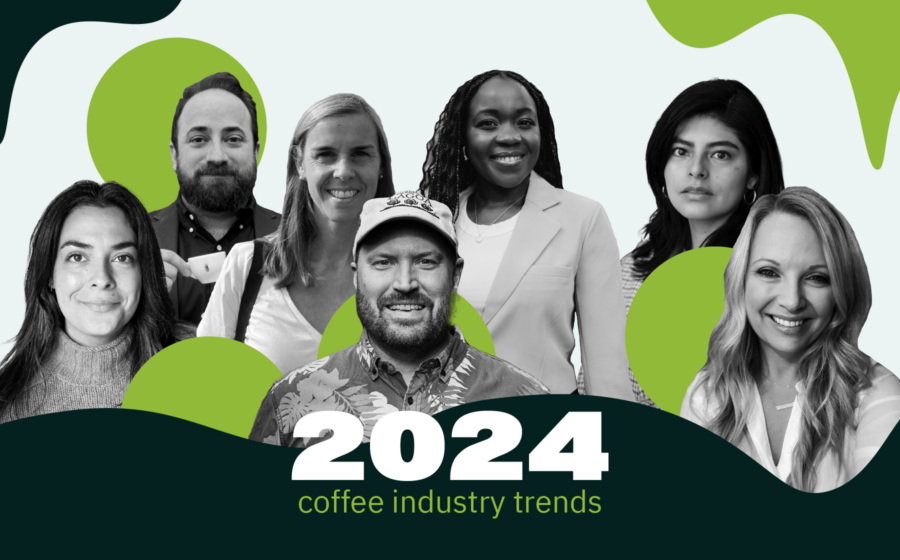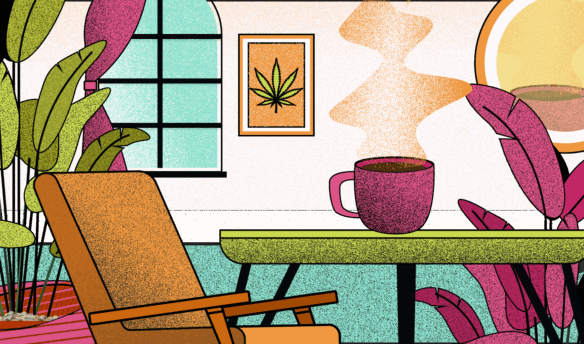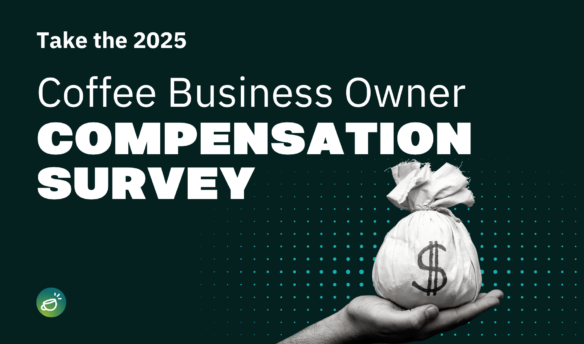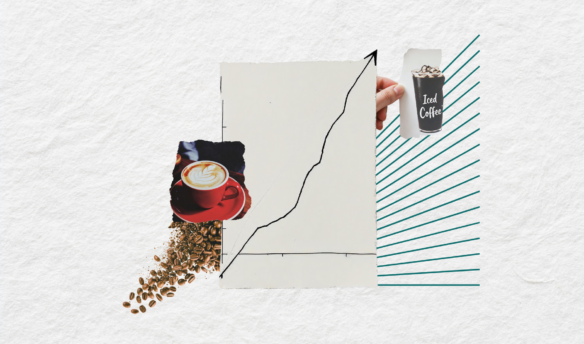It’s March of 2024: How many times this year have you heard someone claim an item is the Next New Thing in coffee? How many times have you witnessed a new idea or movement positioning itself as changing the coffee landscape but seemingly disappearing within weeks?
Our inboxes and social media feeds are flooded with promises of innovative gadgets and can’t-miss trends, and it can be challenging to figure out where to invest your time and energy—how do you know an emerging sensation is worth investigating versus leaving to the wayside with other viral fads.
Every year, we consult experts to find the ideas, gadgets, and emerging trends you need to be watching in 2024. We asked over a dozen coffee luminaries and workers from across the industry to tell us what’s on their minds: What drinks are they observing quietly overtaking menus? How are people thinking about sustainability differently this year than in years past? And will AI improve coffee systems—or harm them?
Get ready to take notes.
Producers are Selling Retail Quantities of Green Coffee to Growing Home/Hobby Roasters Market
Will Frith, Founder/Director at Building Coffee
Digital communities and new, smaller-format, affordable roasting machines will only keep coming, and savvy coffee producers are already carving out niches and creating strong, international-ready brands. As long as shipping and distribution costs can be cooperative, we’ll start to see more and more folks giving coffee roasting a spin (and not turning it into a side hustle or business).
This sounds like a lot of fun, but also kind of scary (or just annoying) for folks who own roasting companies (also me).
Relatedly, the field is getting to be very packed (plus lots of mergers/acquisitions), so companies are going to have to make some decisions about the direction they’re headed, what messaging they want to move with, and the offerings they want to promote. I think the days of thinking our personal tastes will please everyone are behind us, and I believe that’s a good thing.
There’ll be a splintering of specialty coffee brands—expertise-forward, novelty seeker, heavy on the artisan focus, “best of the best” brands vs. the “we make great coffee you’ll enjoy and can depend on for consistency.” Super limited lots changing all the time vs workhorse blends. Both will remain “specialty,” but vibes will diversify. Diversity in specialty coffee is good.
Going Out For Coffee Is Becoming “A Pursuit of Universal Intimacy”
Lucia Bawot, Speaker, Storyteller, Author of We Belong: An Anthology of Colombian Women Coffee Farmers
As much as the experience of “meeting for a coffee” has been categorized as an excuse to catch up with a friend, go on a first date, or have a heart-to-heart with a loved one, it is evolving into an excuse for “a pursuit of universal intimacy.”
Coffee, in all its forms, allows small groups of engaged coffee consumers, connoisseurs, and experts (often strangers) to speak about the unspoken and to experience the value of being actively listened to at intimate encounters that would shape the future of our industry. When I think about the next 2024 coffee trend, I think about “Omasake coffee experiences” taken to the next level—to spaces where people have the opportunity to dive into all the layers that surround coffee, to talk unapologetically about the unspoken, and are given time to consider the “unknown.” This coffee trend will elevate the consumption of coffee into a well-rounded human experience.
Coffee Flavors Will Become More Diverse
Margaret Nyamumbo, Founder/CEO, Kahawa 1893 Coffee
In 2024, we’ll see consumers embrace coffee in new ways, including new flavor profiles that have traditionally not been associated with coffee. We are moving beyond the purity of coffee into a new playground for coffee, spearheaded by Gen Z and the desire for new ways to enjoy coffee.
In particular, these trends have been led by international flavors from Asia and Latin America—we hope to add global flavors from Africa to the mix with our newly launched ready-to-drink coffees. We have an African Spice coffee, which includes freshly ground chai spices inspired by a traditional Kenyan coffee drink known as Kahawa Chungu.
The cold coffee format will continue to be strong, as its versatility makes coffee an ingredient to explore in other drink occasions. For example, we launched our ready-to-drink format at a New York Fashion Week event, where we served espresso martinis. The convenience and versatility of cold, ready-to-drink coffee will extend the growth of coffee as a beverage beyond traditional applications. This is good news for farmers as demand for coffee grows.
2024: The Year of the Blend
Gabe Boscana, Founder/Roaster, Maquina Coffee
Blends are going to continue to make a comeback. You will see a polarization of the uber-intense processed stuff and the blends that are just easy to drink.
Coffee Companies Must Embrace Digital Solutions
Carolina Pirola, Communication Lead, Digital Coffee Future
Amidst impending regulations aimed at curbing deforestation, coffee companies worldwide find themselves at a critical juncture: embracing digital technologies in their operations or risking losing market share in today’s dynamic and evolving landscape.
However, the transition to digitalization requires careful planning and analysis, extending beyond simply selecting a digital solution off the shelf. Each digital tool operates differently, and companies have unique needs. For example, the requirements of a 400-member coffee cooperative in Peru vastly differ from those of a trader in Germany, considering their distinct processes, data flows, and commercial dynamics. It is only through a thorough assessment of each individual case that the adoption of digital solutions can occur smoothly and efficiently. This emphasizes the importance of a tailored approach to digitalization, one that prioritizes customization to ensure seamless integration and optimized efficiency.
More Coffee Bars Will Embrace a Return to Craft
Scott Guglielmino, Marketing Director, La Marzocco USA
As more and more automation becomes available in coffee equipment, coffee bars are going to have to embrace the craft of making espresso drinks. Attention to detail and coffee quality in the early 2010s helped launch specialty coffee into the mainstream, and to stand out and capture customer attention against large chains with superautomatic espresso machines, cafes will need to re-evaluate how they approach drink making from a skill and sensory point of view.
They’ll also have to intentionally plan how espresso technology can enhance their quality and consistency, using tools like built-in scales and timers to allow the barista to focus more on dialing in the perfect grind and less on the mechanics of pulling a shot.
Change in Producing Countries is Happening from Within
Karla Boza Carbonell, Owner, Café Con Cariño
While the industry at origin might be at risk due to low market prices, climate change, a continued increase in the cost of materials, and a labor shortage, not all is lost. Powerful change is happening within these areas. For the past few years, several foreign-led projects have been aimed at coffee-growing communities. However, many of these initiatives are generally short-sighted. Coming from abroad, they don’t understand the local context and are usually short-lived.
Instead, there’s a new generation of coffee professionals from producing origins who are taking matters into their own hands to ensure the future of the coffee industry. These professionals share knowledge in their languages with industry peers, and there’s incredible power in that. A few examples are Next Gen Sintercafe; Latinas in Coffee has started a fantastic online business course, a free resource primarily for coffee farmers but open to Spanish-speaking coffee professionals; in Ecuador and Peru, the Girlsplaining workshop series is an opportunity for women to share coffee knowledge in a safe space.
These initiatives, led by local coffee professionals who understand the area’s language, context, barriers, and opportunities, are generating actual change in the industry. Change that’s coming from within, in my opinion, is the only way you’ll ensure your morning cup of coffee.
The Balance Between Growth and Sustainability in Specialty Coffee Remains Delicate
Jorge Cuevas, Chief Coffee Officer, Sustainable Harvest
As the specialty coffee industry grows and matures, roasters face new economic pressures. In the post-pandemic era of rising inflation followed by high-interest rates, there is a notable trend where specialty roasters are seeking ways to reduce costs, including paying less for green coffee.
This phenomenon can be attributed to various factors affecting our complex coffee supply chain. One contributing factor is the increasing competition among specialty coffee roasters on supermarket shelves, leading some to explore cost-cutting measures to maintain or improve profit margins. Additionally, high volatility in global coffee prices, influenced by climate change, geopolitical issues, and market dynamics, can prompt roasters to simplify offerings and streamline their product lineup. However, it’s crucial to note that this trend does not universally apply to all specialty coffee roasters.
While many roasters are making decisions driven by cost considerations, I envision the broader specialty coffee movement continuing to advocate for responsible sourcing practices, environmental sustainability, and a focus on quality over quantity. As consumers increasingly demand transparency and ethical sourcing in their coffee choices, the industry faces a delicate balance between growth and maintaining its commitment to the principles that define specialty coffee.
Coffee is No Longer Just About Coffee
Laila Ghambari, Consultant, lailaghambari.com
We are seeing trends shift to coffee no longer being just about the brown bean water, but what else can it be—or even not being coffee at all! Signature drinks continue to gain sales over basic coffee drinks, mushroom-infused coffees, coffee or caffeine alternatives, and co-ferments with strawberries. And then obviously the ever-growing trend of energy drinks from brands like Dutch Bros (their #1 selling category).
Coffee is a daily ritual and even an addition for many, and new generations are focused on being free of vices, as we also see in the growing NA lifestyle. Being able to turn that morning cup into a way to get not just energy but other antioxidants, adaptogens, or new flavors seems to be spreading in various ways across our industry.
Asian Coffees are Gaining Mainstream Success
Peace Sakulclanuwat, Trainer/Educator, Coffee Project NY
Based on my personal experience working in a cafe and competing, specialty-grade Asian coffee has been making a scene in the US coffee industry in the last two to three years. With advanced technology and innovative approaches from coffee cultivation to consumption, coffee farmers in Asia are expanding their knowledge of coffee processing to elevate the quality.
This year, I’m competing in the United States Brewers Cup competition with a coffee from Kaleb Jordan, a coffee producer in Thailand who has developed the first Gesha variety in Thai coffee. As a coffee competitor, one of the reasons I compete is not because I want to win (I’d love to one day) but because I want to use the stage to create an opportunity for Asian coffees, especially Thai coffee, to be recognized and visible to the US coffee industry. Through my brewing recipes and connection with Thai coffee, I always aim to wow the judges and impact how excellent and competitive Asian coffee can be among other Gesha or co-ferment coffees.
Climate Change, Globalization, and AI will Impact Coffee
Joe Marrocco, VP of Coffee and Innovation, Fairwave Coffee
The biggest changes to the coffee industry will stem from the biggest movers of our times: climate change, globalization, and artificial intelligence.
Artificial intelligence will continue to drive innovation, creating ever more affordable ways to enhance tools and products while helping new ideas launch quickly. Whether we look at coffee trade, production, roasting, or the development of tools that help along the way—pick a sector, and the influence of AI will further optimize it.
Globalization has a valuable impact on coffee supply chains and trends. As our climate changes, everything changes: cost structures, infrastructure, policy, political relationships, risk – everything. Climate change will force innovation and adaptation. The impact of a global pandemic is still being felt in every coffee-drinking community.
It is not all bad! There’s a newfound fervor for variety and processing experimentation born from farmers and roasters being more connected and conversational than ever. Collaboration is as close as the phone in our pocket. Whether innovation or interference, the smaller our world gets, the more we see the impact in every cup. Things that happen thousands of miles away are felt more quickly and deeply by us all. In the face of so much uncertainty, we will continue to see small businesses unify, large businesses diversify, and new products that lower our negative impact trend.
“Fractional” Employment Means Coffee Work Will Look Very Different
Heather Kelley, Co-CEO, The Coffee MBA
As Dolly Parton once said, “Workin’ 9 to 5, what a way to make a livin’… It’s enough to drive you crazy if you let it.” I hear you, Dolly!
Fortunately, the coffee industry is embracing new and innovative ways to work together, including “fractional” employment and traditional consulting models. The global management consulting services industry was valued at $316 billion in 2021 and is projected to reach $811.3 billion by 2031.
That’s a lot of people seeking more flexible and fulfilling ways to work, and of course, it’s infiltrated the coffee world! The rise of these new employment models can be attributed in part to the pandemic shake-up of our industry and more virtual working arrangements. It’s not only beneficial for workers but for companies as well. With more diverse and skilled employees available, businesses can tap into new levels of talent worldwide and take their growth and operations to new heights. Fractional & consulting arrangements can also create pathways for more inclusive employment practices and fewer tricky HR and compensation issues for employers.
We’re Not Done With Celebrity Coffee Brands
Fionn Pooler, Frequent Fresh Cup Contributor, The Pourover
Celebrity coffee brands will increase in number and get weirder.
Celebrities love slapping their names on random products, and everybody drinks coffee—it’s the perfect branding match. We’ll see more C- and D-list actors jumping on the bandwagon (I’m thinking Casper Van Dien’s Cold Brew), and the rise in posthumous AI will see some beloved musicians resurrected to shill for low-priced coffee pods. I hope I’m wrong about that last one.
The Union Movement Forecasts Positive Upward Mobility in Coffee Work
Ashley Rodriguez, Managing Editor, Fresh Cup
In March, Starbucks agreed to begin bargaining in good faith with its over 400 unionized stores representing nearly 10,000 workers. Many Starbucks workers have been fighting for a union contract since 2021, and coffee-fueled organizing efforts have dominated headlines, with independent outlets across the US coming together to demand a voice in their workplaces.
I can name a hundred reasons why employers should simply recognize their workers when they unionize rather than hire expensive anti-union lawyers and firms, but I think what gets missed in the discussion of coffee unions is how much faith and love unionized workers are showing to the coffee industry. To unionize—instead of leaving the industry—shows a deep care for coffee and a commitment to making coffee jobs sustainable. People want to be in coffee. Let’s make it easier for them to stay.
I hope we take the uptick in coffee unions as an incredibly positive sign that our future remains strong. I foresee a future where barista jobs are no longer treated as “temporary,” and we continue to work industry-wide to professionalize coffee jobs and make them viable across the sector.
All Your Commercial Coffee Gear Is Getting Connected
Garrett Oden, Owner / Publisher, Fresh Cup
The ‘IoT’ (internet of things) hype cycle may have faded by 2017 when we realized that random juicers and sous vide wands didn’t need to be connected to the internet after all, but it looks like the era of connected coffee equipment is just getting started.
Mahlkonig and La Marzocco recently announced a partnership to create The Sync System, a new tech that lets the Mahlkonig E80W Grind-by-Sync espresso grinder to self-adjust grind settings to manage shot consistency according to data incoming from a connected La Marzocco espresso machine. A similar innovation was announced by Barista Equip and Fiorenzato to create the Flow Grinder.
Cropster’s BrewBeacon It’s designed to be paired with a grinder, but sends data from a wide variety of espresso machines to cropster to give managers, trainers, and operators real-time feedback on brewing consistency and machine performance.









